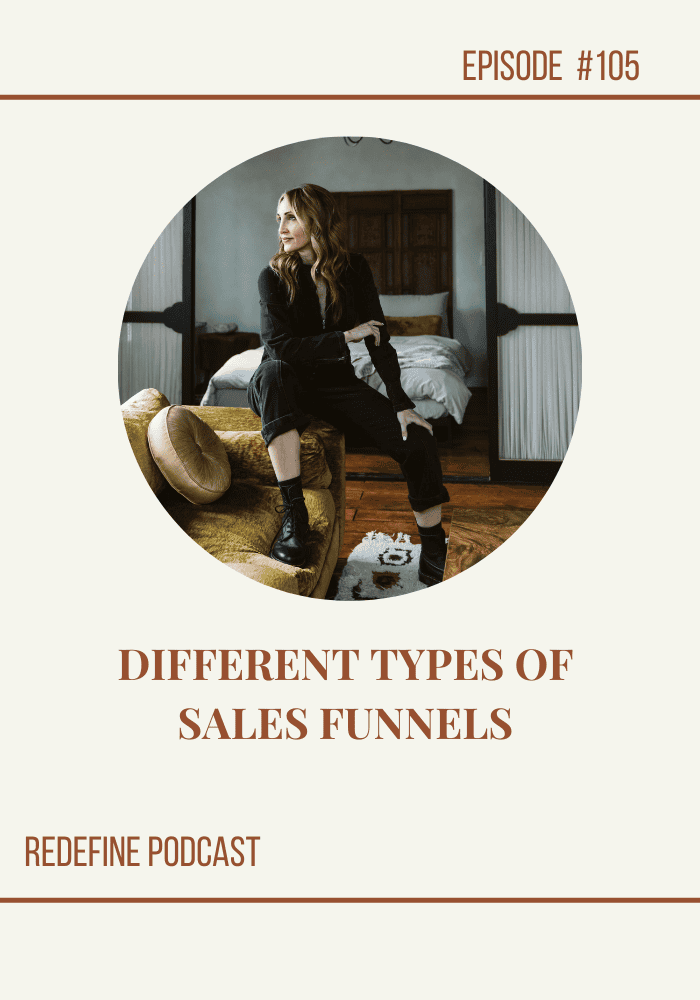
REDEFINE PODCAST
DIFFERENT TYPES OF SALES FUNNELS

A sales funnel is the journey a potential client takes from initial awareness to making a purchase. The core principles of sales funnels stay the same, the strategies can be different across different platforms. In this podcast, we’ll discuss different examples of sales funnels across platforms like podcasting, social media, speaking engagements, networking, and more. We’ll also discuss the importance of lead magnets and nurturing leads to eventually sell a product or service.
Podcasting Sales Funnel:
Podcasting has become a popular platform for building an engaged audience and driving sales. Different people like to consume content in different ways and podcasting has become a fan favorite. For me, it’s the ability to mulit-task. I can listen to a podcast while cleaning my house or working out. It’s a win-win in my book.
Here’s an example of how a podcasting sales funnel might work:
Attract with Valuable Content: The podcast host creates an informative and valuable episode that interests their ideal client and addresses pain points. This positions the host as an authority in their niche.
Lead Magnet Offer: To capture leads, the podcast host offers a free resource related to the podcast content, such as a downloadable eBook, checklist, or exclusive access to bonus episodes. Listeners are encouraged to opt in to the host’s email list in exchange for the lead magnet. The link is added to the show notes both on the podcast platform and on their website.
Nurture Through Email Sequences: Once a listener opts in, they enter an email nurturing sequence where they receive additional valuable content related to the podcast theme. The host builds the know, like, and trust factor with subscribers by providing consistent value and engaging with them through emails.
Product Promotion: As the relationship with subscribers deepens, the host introduces relevant products or services through email promotions. These products could be their own offerings, affiliate products, or sponsorships aligned with the podcast’s theme.
Conversion: Subscribers who have been nurtured and engaged are more likely to convert into customers when presented with offers that resonate with their needs and interests. There are several ways to track conversions, but the easiest way is to create different segments or tags using your email marketing software.
Post-Sale Engagement: After making a purchase, customers continue to receive value through exclusive content, special offers, or invitations to events. This post-sale engagement helps continue the trust and build relationships. This encourages repeat purchases or referrals.
Social Media Sales Funnel:
Social media platforms offer opportunity for reaching and engaging with a wide audience. There are many different platforms available so find the one that you are most comfortable using.
Here’s an example of a social media sales funnel:
Awareness through Engaging Content: A business creates engaging content such as posts, videos, and stories on social media platforms like Instagram, Facebook, or LinkedIn. This content showcases the brand’s personality, values, and offerings, attracting followers and generating awareness.
Lead Magnet Offer: To capture leads from social media, the business offers a free resource or incentive, such as a downloadable guide, webinar, or discount code, in exchange for users’ email addresses or contact information. This can be done by having your audience DM you, click on your profile, leave a comment showing interest, or include a link to your post or story.
Nurture with Targeted Ads and Free Content: The business uses targeted ads and personalized free content to nurture leads on social media platforms. Retargeting ads based on user behavior and interests help keep the brand top of mind and drive engagement with the lead magnet offer.
Product Promotion: Once leads are warmed up, the business promotes its products or services through social media posts, stories, and live streams. Highlighting customer testimonials, case studies, and user-generated content can build credibility and trust.
Conversion: Social media followers who have engaged with the brand and shown interest in its offerings are more likely to convert into customers.
Post-Sale Engagement: After making a purchase, customers are encouraged to follow the brand on social media to stay updated on new products, promotions, and valuable content. Social media platforms serve as a channel for ongoing engagement and customer support.
Speaking Engagements Sales Funnel:
Speaking engagements provide an opportunity to connect with an audience in person or virtually. It is amazing when you are paid to speak, however if you are just starting out often the payment comes in the form of exposure. However, don’t walk away without getting email addresses if possible. Here’s an example of a sales funnel leveraging speaking engagements:
Engage Audience with a Valuable Presentation: A speaker delivers an informative presentation at a conference, seminar, or webinar, showcasing their expertise and addressing the audience’s pain points or interests.
Lead Capture during Presentation: During the talk, the speaker offers a lead magnet or incentive related to the presentation topic, such as a downloadable slide deck, whitepaper, or free consultation. This can be done by creating a link or a QR code that is displayed in the presentation. Attendees are encouraged to provide their contact information to receive the resource.
Follow-Up with Additional Value: After the event, the speaker follows up with attendees via email, providing more value related to the presentation topic. This could include extra resources, exclusive content, or invitations to join a community or webinar series.
Product Offering: As the relationship with attendees progresses, the speaker introduces relevant products or services aligned with the presentation topic. This could be a course, coaching program, consulting services, or books authored by the speaker.
Conversion: Attendees who have engaged with the speaker’s follow-up emails and shown interest in their offerings are more likely to convert into customers.
Post-Sale Engagement: After attendees become customers, the speaker continues to provide value through follow-up emails, exclusive content, or invitations to future speaking engagements. This post-sale engagement strengthens the customer relationship and encourages repeat business or referrals.
Networking Sales Funnel:
Networking provides valuable opportunities to build relationships and generate leads organically. Many business owners depend solely on social media to market, however they are neglecting a very important funnel opportunity and that is in-person networking. Here’s an example of a networking sales funnel:
Build Connections at Events: A business owner attends industry conferences, networking events, or meetups and connects with peers, potential clients, and collaborations. They engage in conversations and exchange contact information with individuals who express interest in their products or services.
Offer Value through Follow-Up: After the event, the business owner follows up with new connections via email, offering value and continuing the conversation. They may share relevant resources, insights, or invitations to upcoming events or webinars.
Personalized Outreach: As the relationship develops, the business owner engages in personalized outreach specific to the needs and interests of the new connection. They offer solutions to challenges discussed during the initial conversation and position themselves as a trusted advisor.
Product Presentation: Once a trusted relationship is established, the business owner presents their products or services as solutions to the connection’s pain points or challenges. They showcase case studies, testimonials, or demonstrations to illustrate the value proposition.
Conversion: Contacts who express interest in the business owner’s offerings are guided through the sales process, this could mean scheduling a consultation, signing up for a trial, or making a purchase.
Post-Sale Engagement: After making a purchase, clients continue to receive support and value from the business owner through ongoing communication, recommendations, and opportunities for additional products or services.
Lead Magnets and Nurturing:
In all the examples above, lead magnets play a crucial role in attracting possible clients and getting their contact information. A lead magnet is a valuable resource that you need to get potential clients in your sales funnels. Once leads are captured, nurturing them through communication is essential for building the know, like, and trust factor.. Nurturing involves providing consistent value through email sequences, social media interactions, or personalized outreach. By delivering relevant content, addressing potential clients needs, and maintaining consistent communication, businesses can move them through the sales funnel effectively.
Sales funnels come in many different shapes and forms in various platforms and channels, each with a unique strategy. Whether it’s through podcasting, social media, speaking engagements, networking, or other platforms, the goal remains the same: attract, engage, nurture, and convert leads into clients.
If you are ready to start building funnels that convert check out my Email Funnels course. In this course I teach business owners how to build funnels that convert followers into clients.
I hope you enjoyed this episode. If you found it helpful I would love you to leave a 5 star review and share with your friends. You are the best! Until next time!
Build Connections at Events: A business owner attends industry conferences, networking events, or meetups and connects with peers, potential clients, and collaborations. They engage in conversations and exchange contact information with individuals who express interest in their products or services.
Offer Value through Follow-Up: After the event, the business owner follows up with new connections via email, offering value and continuing the conversation. They may share relevant resources, insights, or invitations to upcoming events or webinars.
Personalized Outreach: As the relationship develops, the business owner engages in personalized outreach specific to the needs and interests of the new connection. They offer solutions to challenges discussed during the initial conversation and position themselves as a trusted advisor.
Product Presentation: Once a trusted relationship is established, the business owner presents their products or services as solutions to the connection’s pain points or challenges. They showcase case studies, testimonials, or demonstrations to illustrate the value proposition.
Conversion: Contacts who express interest in the business owner’s offerings are guided through the sales process, this could mean scheduling a consultation, signing up for a trial, or making a purchase.
Post-Sale Engagement: After making a purchase, clients continue to receive support and value from the business owner through ongoing communication, recommendations, and opportunities for additional products or services.







